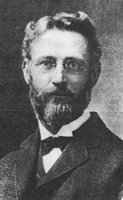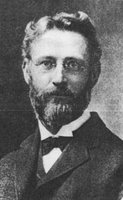
• The grand drama of the unfolding of God's self-revelation in redemptive history raises dilemmas, dilemmas like the fall, the giving of the Sinaitic covenant, and the exile demand to be resolved. It is God who confronts us with those dilemmas. He is holy and we are sinful, and that produces a dilemma for all who have made God their delight. That dilemma is resolved in Christ. In fact history itself continues unresolved until the coming of Christ.
• ...God's purpose for history is personal, including intimate communion with His chosen people, even to become one with them as the Persons of the Godhead are one. God's revelation, then, while necessarily encompassing a cognizant element, goes beyond that. It is a personal revelation whose end is personal communion one with another. And God's revelation not only informs us it transforms us in our inner man and conforms us to the image of that eternal life which is God's purpose.
• Throughout the history of God's revelation, what was present from the beginning progressively comes to light. Nothing new is "added," though different aspects of God's plan become evident which beforehand had been hidden. Revelation progresses in epochal installments or intrusions. The coming to light of that which was shrouded in previous revelation brings new responsibilities to the people of God. One cannot live in the light of full revelation and behave as one for whom that full revelation has not come.
• Since what is present in the consummate revelation of God in His Son, Jesus Christ, is also present, however shrouded, in earlier stages; it lies upon us to uncover where the types and shadows testify the coming reality. For as we have stated before, in light of the culminating revelation of God, the Scriptures, even from the first stages of their growth, are opened up to us in a whole new way. We cannot understand them outside of the context of their fulfillment, a fulfillment which the earlier stages of revelation testify.
• ...from the beginning all redeeming acts of God aim at the creation and introduction of this new organic principle, which is none other than Christ. All Old Testament redemption is but the saving activity of God working toward the realization of this goal, the great supernatural prelude to the Incarnation and the Atonement.
• God chooses men to whom He extends special grace and causes them to stand as figures of the One to come before His people. These heroes are not heroes because of anything inherent in themselves, but because God raises them up and bestows them with special characterizations of the One to come. God projects Christ onto these men and then holds them up before His people so that they might see their Savior, however dimly. But it is essential to understand that these men while types of Christ are types of Adam at the same time. While they testify to the reality to come, they also testify that they are not that reality, in fact, that they need that reality. Nevertheless, God is pleased to call them "friend," and "man after my own heart," and "personal consort" for He sees in them what He has projected onto them, that is His Son.
• The teachings, or word-revelations, accompany the covenantal acts of God, event revelation, and flow from it. Thus it cannot be expected that the teachings of Ezra will have the fullness of scope that the teachings of Peter, though they will be organically unified and complementary. The expressions of devotion from David's heart in the Psalms is uniquely linked to that great self-revelatory act of God in bringing the kingdom of Israel into existence. These expressions inform Paul, but Paul's expressions are more comprehensive, his own expressions being linked to that ultimate self-revelatory act of God in bringing the kingdom of heaven in the person and work of Jesus Christ, that kingdom for which David's kingdom was merely a type. The continuity between David's kingdom and Christ's is that Christ was David's son. The discontinuity is that Christ is David's Lord.
• Vos's theology was driven by the doctrine that pre-fall man had an eschatological hope that transcended life in this creation. The hope set before Adam was a higher estate even from the beginning, for in Vos' words neither God nor man "could be satisfied with an acquaintance based on indirection." In other words, the hope was more God's occasional visitation in which He came and went in the garden. The hope from the beginning was permanent fellowship on a higher plane in which life flowed into life. The course of history, especially sacred history, realizes this hope; and the genius of Vos's biblical theology is his tracing of the covenantal redemptive epochs of history until their climax in Jesus Christ, the last Adam, and His success (first for Himself and then for all who are joined to Him through supernatural regeneration) where the first Adam failed (first for himself and also for all who were in him). Thus all of redemptive history realizes the original purpose of God for His creation, namely eternal (eschatological) Sabbath union with all those whom He chose in Christ from before the foundation of the world as their God and Father.
• The eschatological hope of communion with God on a higher plane which has been promised in the old and fulfilled in the new through the work of Jesus Christ is what Geerhardus Vos preached his entire career. Any form of Christianity that did not aspire to that full and sweet fellowship with God in the heavenlies did not hold interest to Vos because he believed it to be out of step with the biblical witness.











